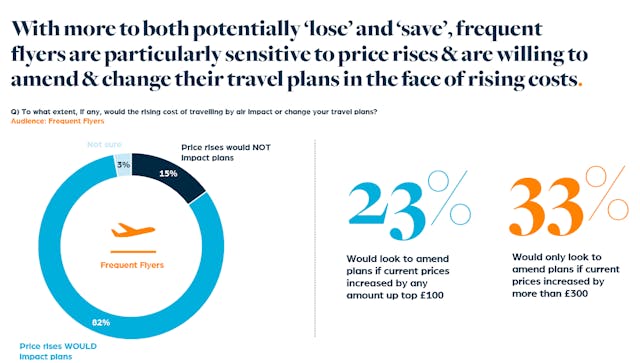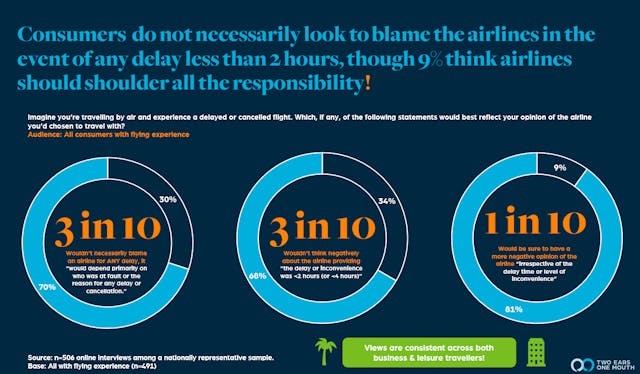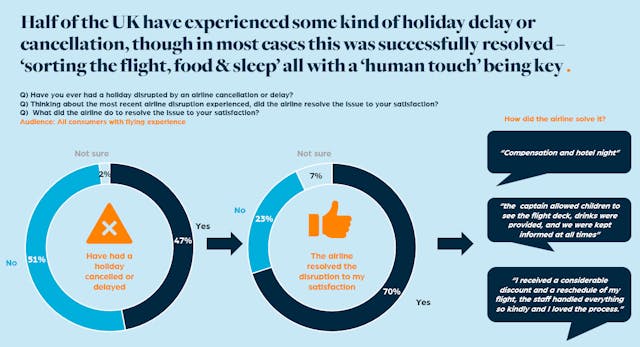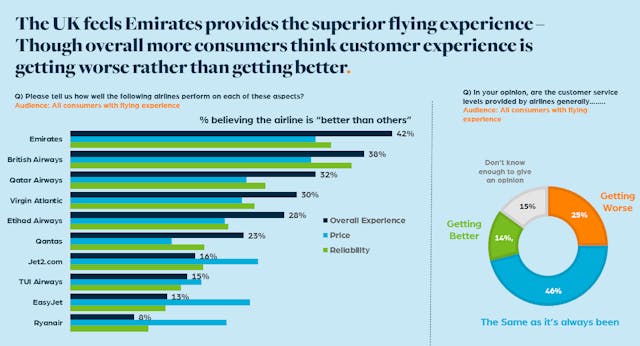So far, 2024 has been an annus horribilis for passenger airlines. As part of The Drum’s Travel & Tourism Focus, we find out what consumers feel about the airline brands they rely on for their overseas travels but which often fail to deliver on their brand promises.
Airlines promise much in their big-budget TV ads, but there cannot be a single operator that hasn’t come under fire criticism for its failings, which range from unreasonable ticket price hikes to inconceivable baggage policies and charges and from infuriating flight delays to even more infuriating holiday cancelations.
However, findings from a specially commissioned consumer sentiment study may suggest that travelers and consumers are developing thicker skins than anticipated and are becoming more resistant to price rises and airline disappointments than press coverage suggests.
Powered by AI
Explore frequently asked questions
For our Travel & Tourism Focus, we thought that over and above hearing from travel and tourism brands and marketing experts, we would canvas views and opinions from the people who really count. The people who keep the entire airline travel trade going – ticket-buying consumers.
The Drum linked up with strategic insight and research specialists Two Ears One Mouth to access its ongoing consumer sentiment tracking research tool to create the Airline Travel Trends Report. The report aimed to gather genuine consumer sentiment around some of the key issues facing the airline sector and measure how they are impacting consumers and affecting the airline purchase decisions they are making.
Picking out his key findings, Alex Duckett, director at Two Ears One Mouth, said: “From the responses, it’s clear that UK consumers appreciate there are sometimes external challenges facing airlines, which will often be outside of their control. It is a minority, around one in 10, that would hold a more negative opinion towards an airline for any kind of delay, irrespective of the reason. Most airline passengers will experience a delay or cancelation at some point in their lives, but provided that brands sort the fundamentals of ‘flight, food and sleep’ where necessary and communicate with an authentic, human response, the majority will be understanding.
“There are many examples across social media of passengers behaving badly on flights, but it’s interesting that around two-thirds of the UK don’t see passenger behavior as necessarily ‘getting worse.’ Rather, they recognize an environment with limited or confined space that can trigger impatience and anti-social behaviors, from unruly children to the impacts of unrestrained alcohol consumption. Ultimately, airlines are ensuring important work events and precious family and holiday moments can happen for consumers exactly as they should. For that reason, perceived reliability of service is a highly salient factor for consumers when making airline booking decisions.”
Here is further breakdown of the key consumer sentiments from the report.
Ticket prices
With more to both potentially ‘lose’ and ‘save,’ findings show that frequent fliers are particularly sensitive to price rises and are willing to amend and change their travel plans in the face of rising costs.
Findings show that the flight plans of 82% of consumers would be impacted by flight price rises, with just 15% of respondents stating that price hikes would not impact their plans. Drilling down further – just less than one-quarter of consumers (23%) would look to amend their travel plans if current prices increased by up to £100.

Baggage costs
Consumers are not supportive of the ongoing changes to the price of taking luggage and baggage on a flight with them.
68% of consumers said that continued hikes in the cost of airline baggage would ‘definitely’ or ‘somewhat’ influence their airline booking decision in the future. And interestingly, 36% of those who would ‘definitely’ be impacted by rising baggage costs were aged 18-34, which makes sense as that group would typically contain younger single price-sensitive travelers.
Almost a quarter of respondents – 22% said rising baggage costs would have ‘little or ‘no’ impact on their airline decision.
Flight delays – who do consumers blame?
There’s nothing more infuriating than a flight delay; however, this is perhaps where we are seeing a slight thaw in consumer attitudes.
Results suggest that the days of delayed travelers yelling angrily at check-in desk staff may be behind us, with three in 10 travelers saying they would not automatically blame the airlines for a delay of less than two hours, and again, three in 10 consumers saying they would not think negatively about the airline providing the delay or inconvenience was less than two hours.
Only 9% of consumers say that they would hold a negative opinion of the airline irrespective of the delay time or inconvenience, which perhaps suggests that airline brands can bounce back faster than imagined after failing passengers.

IT & Tech issues – who’s to blame?
After thousands of air travelers were grounded recently and holidays canceled at a moment’s notice as a consequence of the IT outage caused by CrowdStrike, we see a divide in where consumers feel the blame lies for IT and tech outages.
33% of consumers say they are largely sympathetic to airlines that are experiencing IT and tech disruptions and see that such instances are effectively outside the airline’s controls. Perhaps this is a consequence of most consumers today being beholden to technology that can go wrong at a moment’s notice with little or no explanation.
31% of respondents were also willing to give the airlines the benefit of the doubt and would want to know more details about the issue before deciding if the airline itself should be held accountable.
That said, 30% of respondents were adamant that, irrespective of the outage details, it is the airline’s responsibility to keep things running smoothly regardless of IT and tech issues.
Making amends
Almost half of all respondents had at some time or another had a holiday canceled or delayed by an airline, which in itself is a pretty damning indictment of airline travel in general. Could you imagine endorsing any other type of business that lets down 50% of its customers?
However, 70% of consumers who had had a holiday canceled or delayed by an airline said that the airline involved did resolve the issue to their satisfaction. Compensation, overnight hotel stays, future discounts, visits to the flight deck and free drinks were cited as some of the measures taken by airlines to make amends.

What factors influence airline flight bookings?
The environment is a hot topic and top priority in the aviation and air travel sector, but that doesn’t appear to be a key priority for air travelers and holidaymakers.
Environmental concerns were ranked as the fifth factor of influence for consumers taking flights. Across the sample, Environment scored an average of just 6.5 out of 10, where a score of 1 was least important and 10 was most important. That did rise to a score of 7.6 for business travelers.
Understandably, the reliability of travel was scored as the highest factor of influence with a score of 8.5. Price came in slightly behind at 8.2 and comfort scored at 7.8.
Men (and women) behaving badly
If you spend any time on social media, you will regularly see videos of drunken and disorderly passengers being forced to disembark airplanes by the local constabulary. Air stewards are in a difficult position when faced with the shocking behavior of some passengers. Often, the only recourse they and other airline passengers have is to grin and bear it until the plane can land and offload the troublemakers.
But perhaps increased social media coverage of such issues merely points to increased social media activity and not increased on-board bad behavior as around half of respondents (46%) said they feel the standard of passenger behavior is the same as it has always been.
31% do feel that the standard on on-flight behavior has deteriorated, while a fifth of consumers feel that behavior is improving.
The main pet hates for consumers include limited legroom, being treated like cattle, screaming children and additional costs for food, drinks, and better seats. Drunken passengers also get a mention.
Suggested newsletters for you
Who provides the best experience?

And the final consumer sentiment is around which airline is perceived as providing the best overall flying and travel experience. However, before we get into the best, it’s perhaps worth noting that 25% of regular fliers feel that the flying experience is getting worse across the board, with only 14% feeling that the airline experience is getting better.
It may come as little surprise that Emirates ranks as the airline providing the best flying experience, with 42% of respondents giving it their support. In second place with 38% is British Airways, which may come as some surprise as recent press reports have highlighted poor performance in terms of light delays and dips in quality across its in-flight food service.
Ranking third with 32% is Qatar Airways, followed by Virgin with 30% and Etihad with 28%.
Two Ears One Mouth conducted online interviews with 506 people across all ages, UK regions and genders. The survey took place between July 26 and July 29 and consisted of closed and open-ended questions.

